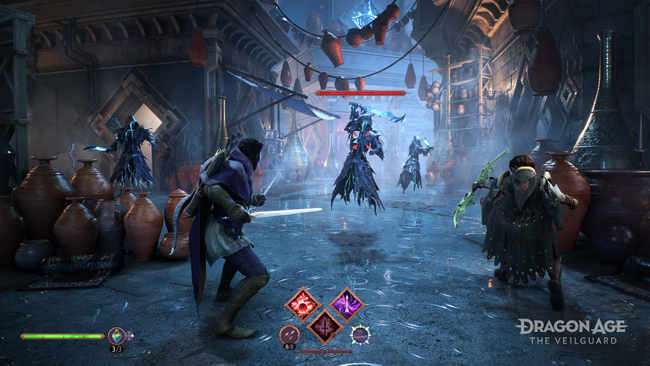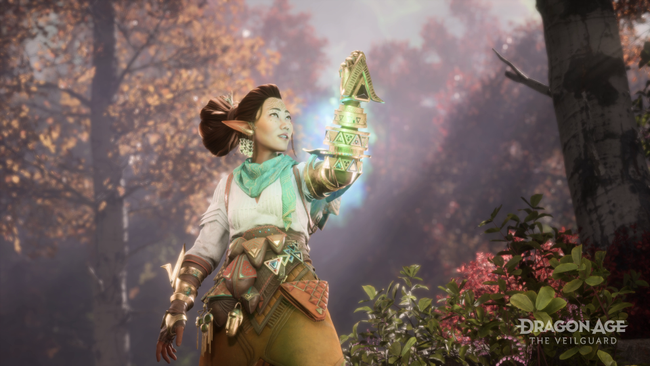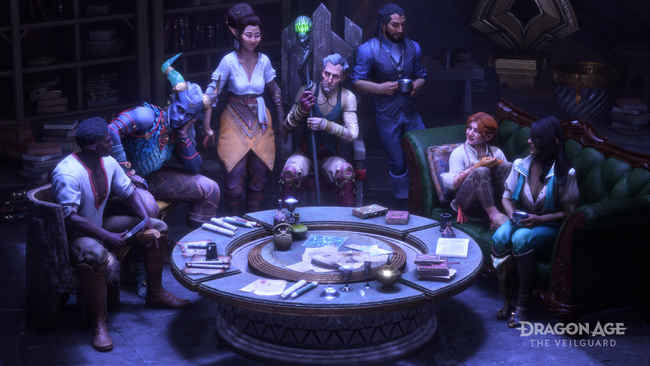Dragon Age: The Veilguard’s director talks RPG systems, skill trees, and being inspired by Final Fantasy XII

Dragon Age: The Veilguard was fully revealed with a flurry of exciting activity this week, with BioWare putting out a trailer, some gameplay footage, and a bunch of information. But as the promotional material focuses on courting the mainstream with dazzling action-led footage and its cast of characters, it of course has led to one key fan outcry: is it still a role-playing game?
Advertisement. Keep scrolling for more
Naturally, we were interested in that too. The hands-on offered glimpses of an incredible character creator, interesting dialogue choices, and some consequences for those choices – all role-playing staples. But what about combat? What about good old-fashioned RPG character progression and growth, which in many ways is the bedrock of the genre?
After seeing the hands-off demo, we got a chance to briefly chat with Dragon Age: The Veilguard director Corinne Busche – who right away gushes about being a real RPG system nerd. I get the impression we could’ve sat and talked about classic RPGs and their mechanics for hours; she is one of us. In our brief chat, she expands on how The Veilguard’s progression, growth, and skill tree work – revealing granular information not present in the demo shown so far. Here’s our chat.

RPG Site: So, can you just broadly talk to me about… in that preview, we don’t even see the menu, right? So can you talk to me about where the game sits and what it’s like in terms of that RPG progression, from the perspective of hardcore RPG fans?
Corinne Busche: Incredibly deep! So if I were to contrast Mass Effect versus Dragon Age, for instance… I really view Mass Effect as an ARPG. Big action, minor RPG. We’re almost the total inverse of that.
So a few missions in, you unlock the skill tree right away, Every level up, you get skill points, of course. The skill tree is absolutely enormous and it is bespoke for your class. So when we talk about the specializations, we know that skill trees can be overwhelming to players as well. So what I love – I’ll try to paint a picture for you….
When it is unlocked, imagine almost a gigantic spider web-like visual. And if I’m a mage right at the very center is the core of the Mage kit.
RPG Site: So I’m gonna interrupt you briefly here and say something – this may resonate with you, it may not – but when you say that, I think, er… Final Fantasy X Sphere Grid.
Advertisement. Keep scrolling for more
Corrine Busche: Heavily influenced! Absolutely. Final Fantasy X – one of my all-timers. I will tell you that 12, especially the Zodiac edition, is my favorite. The level of ability selection, passives, in our case also traits – I would say the amount of customization is more analogous to that. The organization is more similar to the Sphere Grid.
So Final Fantasy XII might be in my top three favorite games. I’m highly influenced by that when it comes to our progression. But if you, if you want to paint a picture, the spear grid is more… not an exact match, but it’s more akin.
What we’ve done though, to make it more accessible, is that each of the specializations is on the outer edges of the grid.
RPG Site: So you start in, and you work outwards, but you get to choose which direction you work out into?
Busche: Yeah. I know where I’m going to start. I have an idea of which specialization looks or sounds the coolest – and that really aids players in charting their course so they’re not just lost to the wilds.

RPG Site: So that’s why you surface that at the start – show not just the core classes, but also what the specialization options are, right there in the character creator, right? Because you want people to know ‘oh, I’m a Warrior, I’ve got this specialization up here, this down here’, and you choose your direction.
Busche: And we even put some uh helper labels along the way. So it is divided into three sections in addition to the specializations. In the case of Warrior for instance you have a section that’s more defense-oriented, one that’s more weapons oriented, and one that’s more ability oriented. So what you might do trying to get to, say, the Reaper specialization is go… Rather than going up through defense into Reaper, I’m going to go down through Ability into Reaper.
RPG Site: That’s a great, real easy way to sell it, really – talking about the license grid, the sphere grid… people, our audience, they definitely get that. Can you talk about, within that, the breadth of skills and how often you’ll be getting new stuff?
Busche: So, the skills are unique per class. Every level you get a skill point, there are other site activities to get skill point… We are very player-friendly; you can refund your last, refund the whole thing…
Advertisement. Keep scrolling for more
We have a level cap of 50. One of my frustrations with some other games that have similar skill tree systems is that getting up into the specialization might take up absolutely all of your skill points, and then you have nothing else.
We’re the exact opposite. You get into your specialization about mid-game, and then you can really branch out.

RPG Site: And how about the party members?
Busche: They all have unique skill trees, too. Now, those ones – we don’t want to overwhelm the players. So their skill trees are organized around their individual abilities. So when you unlock their full suite of abilities, each one has a skill tree full of choices where you can get autonomous usage, or lower the cooldowns, or add additional effects to the ability.
RPG Site: What is the breadth of the actual active abilities for them? Like, are the characters quite prescribed with a handful of core abilities, or is it a larger number where the player is choosing which ones are on the ability wheel?
Busche: So each follower, each companion has five core abilities. There are decisions you can make along the way that add mechanical changes to each ability.
Now, going back to your question – Neve and Bellara are both Mages, so they share two core Mage abilities between each other, right? However, the other three are class or character-unique. Neve is an ice mage, Bellara is not – so Neve is going to have ice-specific abilities that are unique to her.
RPG Site: I’m being signaled we’re out of time, but first, just on that topic – elemental stuff. There’s been an increasing trend of some games making elemental stuff just a visual thing… but you mention ice magic there. So are elements a factor in combat? Or does it not matter?
Busche: Hell yeah. Oh, it really matters!
Advertisement. Keep scrolling for more
RPG Site: Good! Thank god for that. [laughs] Thanks for your time – hopefully, we can nerd out again before launch.
Source link




